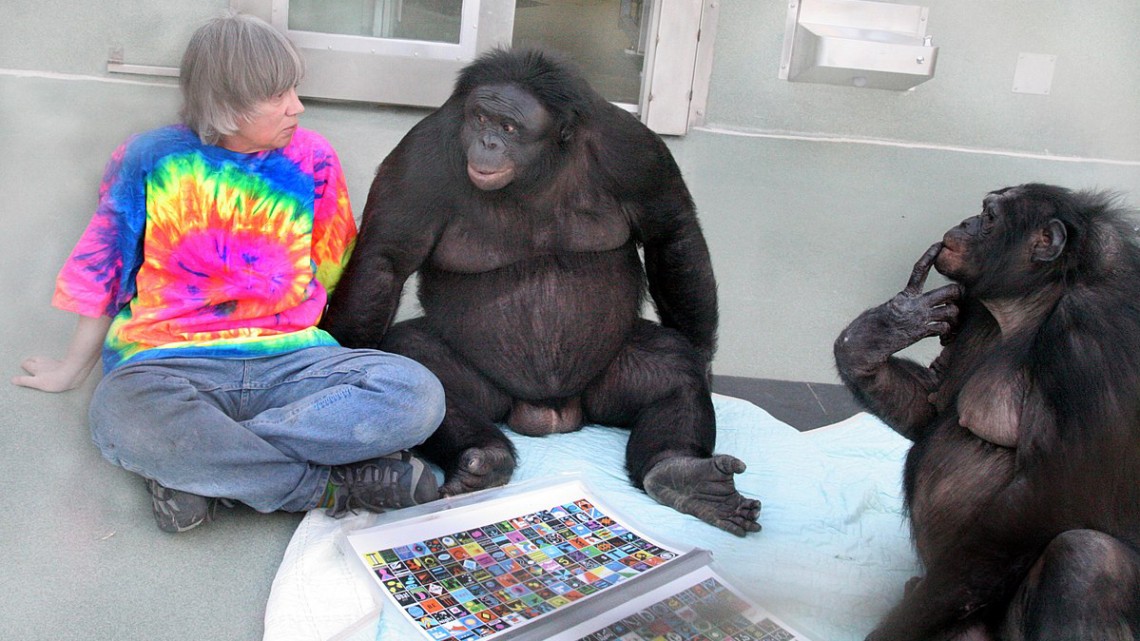
Bonobos Kanzi and Panbanisha with Sue Savage-Rumbaugh.
Workshop takes transdisciplinary approach to great ape communication
By Linda B. Glaser
How have systems of communication evolved among the great apes? How did language arise? How can humans and apes best communicate?
Oct. 20-21, Cornell will host a transdisciplinary workshop on apes, language and communication to explore these and other questions. “The Eloquence of the Apes” will feature primatologist Sue Savage-Rumbaugh and Cornell researchers across multiple disciplines. The conference, to be held in the A.D. White House, is free, and the public is invited.
“Our goal is to open up a new space for intense conversation between humanists, social scientists and scientists,” said organizer Laurent Dubreuil, professor of Romance studies and comparative literature and affiliate of the Cognitive Science Program. “The emerging fields of ‘post-humanities’ and ‘animal studies’ are engaged in a wide reassessment of sciences and technologies, while many new and exciting developments at the crossroads of the sciences are currently reinterpreting the diverse facets of human (and animal) culture that have traditionally been explored by the humanities.”
Savage-Rumbaugh has used computerized means to give chimpanzees and bonobos access to symbolic culture and human language. Her work has been called controversial and groundbreaking, and has garnered accolades including two honorary degrees and an inclusion in the 2011 list of Time magazine’s “100 Most Influential People.”
The workshop sessions will be divided into three themes: evolution and origin of communication in human and nonhuman primates; what language brings to apes; and the apes and the humanists. Cornell presenters include Dubreuil; Morten Christiansen, professor of psychology; Barbara Finlay, the Kenan Professor Emerita of Psychology; Cathy Caruth, the Rhodes Professor in the Humanities; and Peter Gilgen, associate professor of German Studies.
In connection with the workshop, Dubreuil and Christiansen are co-teaching a class this fall that they see as “a path toward the creation of a new field at the interface of different modes of inquiry,” titled Cognition, Culture and the Humanities. “To the best of our knowledge, this is the first class ever to be cross-listed in Neurobiology and Behavior, Comparative Literature, Psychology and Cognitive Science at Cornell and maybe elsewhere,” notes Dubreuil.
On Oct. 20, a video screening followed by a roundtable discussion will present the recent donation to the Cornell Division of Rare and Manuscript Collections by Savage-Rumbaugh of more than 300 hours of video files archiving experiments she conducted with apes from the late 1970s to the late 1990s.
Eloquence of the Apes is sponsored by the Society for the Humanities; the Departments of Romance Studies, Psychology and Comparative Literature; the Cognitive Science Program, the College of Arts and Sciences; the Rhodes Professorship in the Humanities; the Division of Rare and Manuscript Collections; and the Phi Beta Kappa Society.
Linda B. Glaser is a writer for the College of Arts and Sciences.
Media Contact
Get Cornell news delivered right to your inbox.
Subscribe